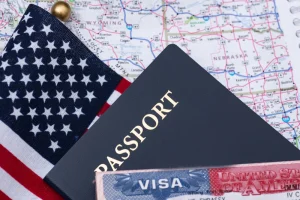By Brian Figeroux, Esq. | Law Firm of Figeroux & Associates | www.askthelawyer.us
The landscape of marijuana legality in the United States is complex and rapidly evolving at the state level. A growing number of states have legalized cannabis for medical and/or recreational use, creating a patchwork of state laws that often stand in direct conflict with federal law. For U.S. citizens, this conflict primarily presents issues related to state versus federal jurisdiction, taxation, and banking. However, for noncitizens – including lawful permanent residents, visa holders, and those seeking immigration benefits – involvement with marijuana, even in states where it is legal, carries significant and often severe immigration consequences, ranging from inadmissibility and deportability to denial of naturalization. This analysis delves into the legal risks associated with cannabis-related activity for noncitizens, exploring how use, production, and sales impact their immigration status and providing guidance on how immigration practitioners can screen and advise clients on controlled substance issues during green card, immigrant visa (IV), non-immigrant visa (NIV), and naturalization processes.
The Fundamental Conflict: Federal Supremacy and the Controlled Substances Act
The root of the problem for noncitizens lies in the Supremacy Clause of the U.S. Constitution, which establishes federal law as the supreme law of the land. While states have the authority to regulate activities within their borders, federal law can preempt state law when there is a direct conflict or when Congress intends to occupy a field exclusively. In the case of marijuana, the federal Controlled Substances Act (CSA) of 1970 lists cannabis as a Schedule I drug, the most restrictive category, alongside heroin and LSD. This classification signifies that, under federal law, marijuana is considered to have a high potential for abuse, no currently accepted medical use in treatment in the United States, and a lack of accepted safety for use under medical supervision.
Despite the wave of state-level legalization, the federal classification of marijuana as a Schedule I substance remains unchanged. This means that possessing, cultivating, distributing, or selling marijuana, or conspiring to do so, are federal crimes, regardless of state law. Federal agencies, including those responsible for immigration enforcement and adjudication (U.S. Citizenship and Immigration Services – USCIS, Customs and Border Protection – CBP, Immigration and Customs Enforcement – ICE, and the Department of State – DOS), operate under federal law. Consequently, any activity that violates the federal CSA can trigger adverse immigration consequences for noncitizens.
The Department of Justice (DOJ) has, at times, issued guidance suggesting a de-prioritization of federal enforcement against marijuana activities in states with robust regulatory schemes, such as the Cole Memorandum (rescinded in 2018). However, such guidance does not change the underlying law and can be rescinded at any time. Furthermore, immigration agencies are not bound by DOJ enforcement priorities and can independently determine whether a noncitizen’s conduct violates the CSA for immigration purposes.
Immigration Consequences: Inadmissibility and Deportability
Involvement with controlled substances, including marijuana, can lead to both inadmissibility and deportability under the Immigration and Nationality Act (INA). Inadmissibility prevents a noncitizen from entering the United States or obtaining an immigration benefit such as a green card or visa. Deportability makes a noncitizen, even a lawful permanent resident, removable from the United States.
Grounds of Inadmissibility (INA § 212(a)(2))
Several grounds of inadmissibility relate to controlled substances, which are particularly relevant for noncitizens applying for green cards (either through adjustment of status in the U.S. or consular processing abroad) or immigrant/non-immigrant visas.
- Controlled Substance Violations (INA § 212(a)(2)(A)(i)(II)): This ground makes inadmissible any alien convicted of, or who admits having committed, or who admits committing acts which constitute the essential elements of, a violation of (or conspiracy or attempt to violate) any law or regulation of a State, the United States, or a foreign country relating to a controlled substance (as defined in section 102 of the Controlled Substances Act (21 U.S.C. 802)). Since marijuana is a controlled substance under the federal CSA, a conviction or even an admission of a violation relating to marijuana triggers this ground. This applies regardless of whether the conviction or admission occurred in a state where marijuana is legal.
- Drug Traffickers (INA § 212(a)(2)(C)): This is a particularly harsh ground. It makes inadmissible any alien whom a consular officer, the Attorney General, or the Secretary of Homeland Security knows or has reason to believe is or has been an illicit trafficker in any controlled substance or is or has been a knowing aider, abettor, assister, conspirator, or colluder with others in the illicit trafficking in any such controlled substance. The term “illicit trafficker” is interpreted broadly and does not require a conviction or even a formal arrest. Simply working in a state-legal marijuana dispensary, investing in a cannabis business, or facilitating the transfer of marijuana can be considered “illicit trafficking” in the eyes of federal immigration authorities, triggering this permanent ground of inadmissibility for which there is generally no waiver available.
Grounds of Deportability (INA § 237(a)(2))
Lawful permanent residents and other noncitizens already in the United States can be subject to removal proceedings based on controlled substance violations.
- Controlled Substances (INA § 237(a)(2)(B)(i)): Any alien who is convicted of a violation of (or a conspiracy or attempt to violate) any law or regulation of a State, the United States, or a foreign country relating to a controlled substance (as defined in section 102 of the Controlled Substances Act (21 U.S.C. 802)), other than a single offense involving possession for one’s own use of 30 grams or less of marijuana, is deportable. This ground is triggered by a conviction, not just an admission.
- Drug Abusers and Addicts (INA § 237(a)(2)(C)): Any alien who is a drug abuser or addict is deportable. While not directly tied to a conviction, this ground can be relevant if marijuana use is deemed to constitute abuse or addiction by a medical professional during an immigration medical exam.
Specific Marijuana-Related Activities and Their Risks
Understanding how different types of involvement with marijuana are viewed under federal immigration law is crucial.
- Simple Possession for Personal Use: A conviction for simple possession of marijuana, even a small amount, can trigger inadmissibility under INA § 212(a)(2)(A)(i)(II). However, there is a limited exception for deportability: a single offense involving possession for one’s own use of 30 grams or less of marijuana does not make a noncitizen deportable under INA § 237(a)(2)(B)(i). This exception is narrow; it only applies to deportability, only to a single offense, only to possession for personal use, and only to 30 grams or less. Any other controlled substance conviction, possession of more than 30 grams, multiple possession offenses, or possession with intent to distribute will trigger deportability. Furthermore, even a single conviction for possession of 30 grams or less can still make a noncitizen inadmissible, impacting applications for benefits like adjustment of status or naturalization.
- Cultivation/Production: Growing marijuana, even a single plant for personal use in a state where it’s legal, is considered production under federal law and can trigger both inadmissibility and deportability grounds. This is often viewed more seriously than simple possession.
- Distribution/Sales: Any involvement in distributing or selling marijuana, regardless of the quantity or whether it’s done through a state-licensed business, is considered illicit trafficking under federal law. This triggers the severe and generally unwaiverable inadmissibility ground under INA § 212(a)(2)(C) and can also lead to deportability.
- Employment in the Cannabis Industry: Working for a state-legal marijuana business, such as a dispensary, cultivation facility, or processing plant, is considered aiding, abetting, assisting, or conspiring in illicit trafficking under federal immigration law. This is because the business itself is trafficking in a federally controlled substance. Noncitizens employed in such roles are at high risk of being found inadmissible under INA § 212(a)(2)(C) and potentially deportable. This includes roles ranging from budtenders and growers to managers and administrative staff.
- Investment in the Cannabis Industry: Investing in a marijuana business, even passively as a shareholder in a publicly traded company involved in cannabis, can potentially be viewed as aiding or assisting in illicit trafficking. While the risk might be lower for passive investors in large companies compared to active investors or owners of smaller businesses, the possibility exists, particularly if the investment is substantial or involves active participation in the business.
Impact on Different Immigration Processes
The risks associated with marijuana activity manifest differently depending on the immigration benefit being sought.
Green Card (Adjustment of Status and Consular Processing)
Applying for lawful permanent resident status (a green card) requires demonstrating admissibility to the United States. Both adjustment of status (applying from within the U.S.) and consular processing (applying from abroad) involve a thorough review of the applicant’s criminal history and controlled substance involvement.
- Adjustment of Status (AOS): When applying for AOS, USCIS adjudicators review the applicant’s record for any grounds of inadmissibility. A conviction or admission related to marijuana can trigger INA § 212(a)(2)(A)(i)(II). Involvement in the marijuana industry or significant investment can trigger the drug trafficker ground under INA § 212(a)(2)(C). If a ground of inadmissibility is found, the application will likely be denied unless a waiver is available and approved. The waiver for INA § 212(a)(2)(A)(i)(II) (for a single offense of simple possession of 30 grams or less of marijuana) is available under INA § 212(h), but it is discretionary and requires demonstrating extreme hardship to a qualifying relative. The drug trafficker ground (INA § 212(a)(2)(C)) is generally unwaiverable.
- Consular Processing: Applying for an immigrant visa at a U.S. embassy or consulate abroad involves an interview with a consular officer. Consular officers are also bound by federal law and will assess inadmissibility grounds. They are often more stringent in their interpretation and application of the law, particularly regarding the “reason to believe” drug trafficker ground (INA § 212(a)(2)(C)). Consular officers frequently ask about marijuana use, employment, or investment, especially if the applicant is coming from a state or country where it is legal. An admission of even simple use can potentially trigger INA § 212(a)(2)(A)(i)(II), although policy guidance has sometimes suggested discretion for isolated past use. However, any indication of involvement in the industry or trafficking is highly likely to result in a visa denial under INA § 212(a)(2)(C).
Immigrant Visas (IV)
Similar to green cards, obtaining an immigrant visa requires meeting admissibility standards. The same grounds under INA § 212(a)(2) apply, and consular officers will scrutinize any past or present marijuana involvement. The risks and waiver possibilities are the same as those discussed for consular processing of green cards.
Non-Immigrant Visas (NIV) and Entry to the U.S.
Applying for a non-immigrant visa (such as a tourist visa, student visa, or work visa) or seeking entry to the U.S. with an existing visa or through visa-free programs (like the Visa Waiver Program) also involves an assessment of admissibility.
- NIV Applications: Consular officers evaluating NIV applications will consider controlled substance grounds. An admission of past marijuana use or any indication of involvement in the industry can lead to a visa denial under INA § 212(a)(2)(A)(i)(II) or INA § 212(a)(2)(C).
- Entry at the Border/Port of Entry: CBP officers at ports of entry have the authority to question arriving noncitizens about their admissibility. Questions about marijuana use, employment, or travel to states/countries where it’s legal are common. An admission of past use or any perceived connection to the industry can lead to being found inadmissible and denied entry. Lawful permanent residents returning to the U.S. are also subject to inspection and can be placed in removal proceedings if found inadmissible, including on controlled substance grounds. CBP has explicitly stated that working in or facilitating the growth, distribution, or sale of marijuana in Canada (where it is federally legal) for commercial purposes may affect admissibility to the U.S.
Naturalization
Applying for U.S. citizenship through naturalization requires demonstrating good moral character (GMC) during the statutory period (usually the 5 years, or 3 years for spouses of U.S. citizens, immediately preceding the application). Certain criminal offenses, including controlled substance violations, can preclude a finding of GMC.
- Controlled Substance Convictions: A conviction for a controlled substance violation, other than a single offense of simple possession of 30 grams or less of marijuana, is considered a “permanent bar” to GMC. This means that if the conviction occurred during or before the GMC period, the naturalization application will be denied.
- Admissions and Other Conduct: While not a permanent bar, admissions of controlled substance violations or involvement in activities that could trigger inadmissibility/deportability grounds (even without a conviction) can negatively impact a GMC determination. USCIS adjudicators have discretion to consider all relevant conduct during the GMC period. Involvement in the state-legal marijuana industry, even without a conviction, could be viewed as demonstrating a lack of respect for federal law and therefore a lack of GMC.
Key Legal Concepts and Exceptions
Understanding specific legal concepts is vital when analyzing marijuana’s impact on noncitizens.
- Conviction vs. Admission: Immigration law distinguishes between a “conviction” and an “admission.” A conviction generally requires a formal judgment of guilt by a court. An admission, for immigration purposes, requires the noncitizen to admit to the essential elements of the crime, that the crime is a violation of U.S. law, and that they are guilty of the offense. Admissions can occur during interviews with immigration officers (USCIS, CBP, consular) or through written statements. An admission of a controlled substance violation can trigger inadmissibility even without a conviction.
- The Simple Possession Exception (INA § 212(a)(2)(A)(ii)(I)): As mentioned, this exception to inadmissibility exists for an alien who has committed only one offense of simple possession of 30 grams or less of marijuana. This is not an exception to the definition of a controlled substance violation, but rather a specific waiver provision within the inadmissibility grounds. It is discretionary and requires an application and a showing of extreme hardship to a qualifying relative (U.S. citizen or lawful permanent resident spouse, parent, or child). This waiver is not available for the drug trafficker ground (INA § 212(a)(2)(C)).
- The “Reason to Believe” Drug Trafficker Ground (INA § 212(a)(2)(C)): This ground is particularly problematic because it does not require a conviction. It can be triggered by any credible evidence that leads an immigration officer to believe the noncitizen has been involved in illicit trafficking. This broad interpretation is why working in or investing in the state-legal marijuana industry is so risky. The officer does not need proof beyond a reasonable doubt, only a “reason to believe.”
Screening Noncitizen Clients
Given the severe and often hidden risks, it is imperative for immigration practitioners to thoroughly screen all noncitizen clients about any past or present involvement with marijuana and other controlled substances, regardless of where they live or the apparent legality of the activity under state or foreign law. Clients may not realize that state legalization does not protect them under federal immigration law.
Essential screening questions should include:
- Have you ever been arrested, cited, or charged with any crime, anywhere in the world, including those related to marijuana or other drugs? (Request all court and police records).
- Have you ever been convicted of any crime, anywhere in the world, including those related to marijuana or other drugs? (Request all court records).
- Have you ever used marijuana or any other controlled substance? If so, when, where, how often, and in what quantities? (This is crucial for identifying potential admissions).
- Have you ever purchased, sold, cultivated, or distributed marijuana or any other controlled substance? If so, when, where, and in what quantities?
- Have you ever worked in the marijuana industry, even in a state where it is legal? If so, what was your role, for what type of business, and for how long?
- Have you ever invested in a marijuana business? If so, what was the nature and extent of the investment?
- Have you ever traveled to a state or country where marijuana is legal? Were you asked about marijuana use or involvement upon entry to the U.S.?
- Have you ever discussed marijuana use or involvement with a U.S. immigration officer (USCIS, CBP, consular)? If so, what was discussed?
It is critical to explain to the client why these questions are being asked and the potential immigration consequences of their answers. Clients need to understand that honesty is essential, as providing false information to immigration authorities is itself a serious offense.
Advising Noncitizen Clients
Advising clients with any history of marijuana involvement requires a candid assessment of the risks and a clear explanation of the potential consequences for their specific immigration goals.
- Cease All Activity: For clients currently involved in any marijuana-related activity, the most critical advice is to cease all involvement immediately. This includes use, cultivation, sales, employment, and investment. Continuing such activity while pursuing an immigration benefit is highly risky and can be interpreted negatively by immigration authorities.
- Assess the Risk: Based on the client’s history and the specific immigration benefit sought, assess the likelihood of triggering an inadmissibility or deportability ground. Consider whether there is a conviction, an admission, or evidence that could lead to a “reason to believe” finding of drug trafficking.
- Review Records: Obtain and thoroughly review all relevant court records, police reports, and any prior immigration applications or interview transcripts where controlled substance issues may have been discussed.
- Evaluate Waiver Eligibility: If an inadmissibility ground under INA § 212(a)(2)(A)(i)(II) is triggered by a single simple possession offense of 30 grams or less of marijuana, evaluate eligibility for the INA § 212(h) waiver. Explain the requirements and the discretionary nature of the waiver. Emphasize that this waiver is generally not available for the drug trafficker ground (INA § 212(a)(2)(C)).
- Prepare for Interviews: If an interview with USCIS, CBP, or a consular officer is anticipated, prepare the client thoroughly for questions about controlled substances. Advise them to answer truthfully but concisely. Avoid volunteering information not specifically asked. If a conviction or admission exists, discuss how it will be addressed during the interview.
- Consider the Timing: The timing of an application relative to past marijuana activity can be relevant, particularly for GMC determinations for naturalization. However, inadmissibility grounds can arise from conduct that occurred many years ago.
- No Guarantees: It is crucial to manage client expectations. Even in seemingly minor cases, the discretion of immigration officers and the strict interpretation of federal law mean there are no guarantees.
- Alternative Strategies: If the risks are too high for the desired immigration benefit, explore alternative strategies, such as delaying the application, seeking different immigration pathways, or accepting that the desired benefit may not be attainable at this time.
Conclusion
The conflict between state-level marijuana legalization and federal prohibition under the Controlled Substances Act poses a significant and often underestimated threat to noncitizens in the United States. Involvement in marijuana-related activities, including use, production, sales, employment, or investment, can trigger severe immigration consequences such as inadmissibility and deportability, impacting eligibility for green cards, visas, and naturalization.
Immigration practitioners have a critical responsibility to educate their noncitizen clients about these risks and to conduct thorough screening regarding any past or present involvement with controlled substances. Advising clients requires a clear explanation of federal law supremacy, the specific grounds of inadmissibility and deportability, the limited exceptions and waivers, and the importance of ceasing all prohibited activity. While the legal landscape surrounding marijuana continues to evolve, the fundamental principle that federal immigration law governs the fate of noncitizens in the U.S. remains unchanged. Until federal law is amended to align with state legalization trends, noncitizens must navigate this complex area with extreme caution and expert legal guidance.




